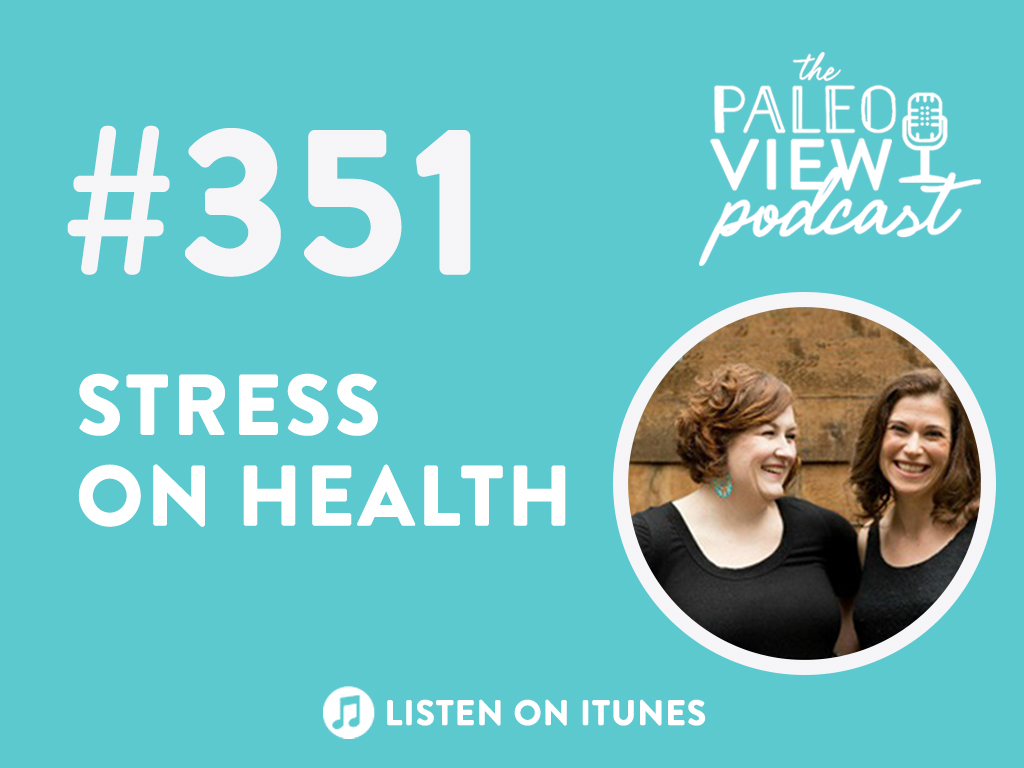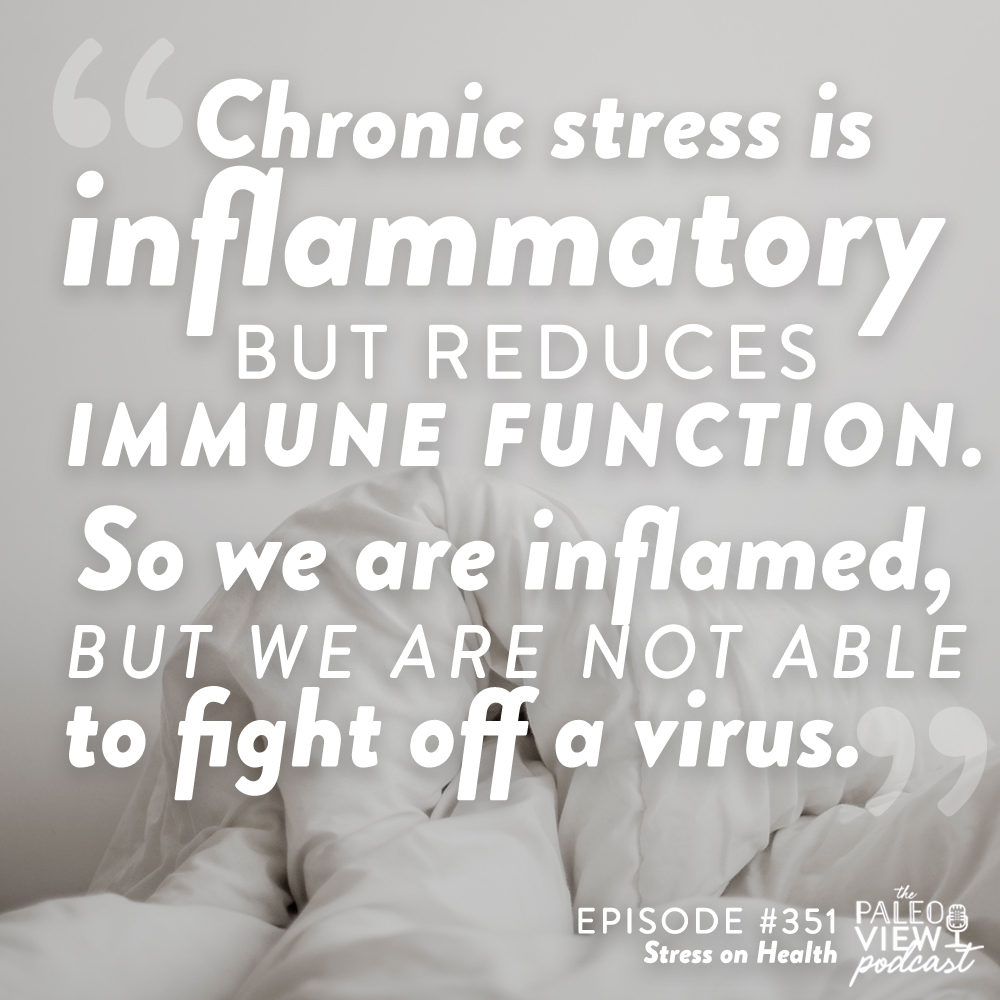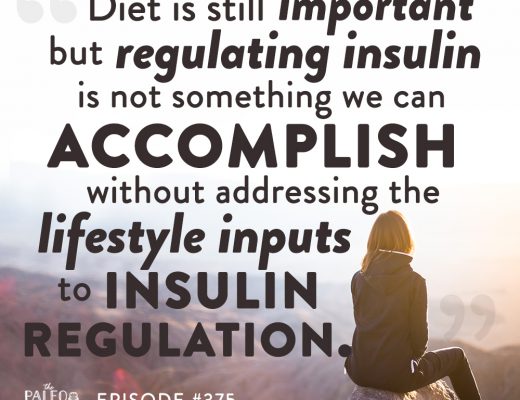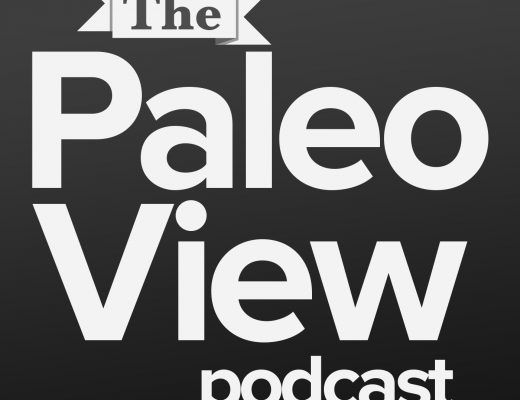
On this episode, Sarah and Stacy talk all things stress. What happens in the body when we are dealing with the various forms of stress, what are the sources of stress and how do we build awareness around our own personal stressors, and lastly (and perhaps most importantly) how do we reduce our stress and ultimately improve our quality of life. Enjoy!
Click here to listen in iTunes
If you enjoy the show, please review it on iTunes!
The Paleo View (TPV), Episode 351: Stress on Health
-
-
(0:41) Welcome
- Welcome back, listeners!
- Sarah and Stacy are back to a regular recording schedule
- This morning America’s royal baby was born
- This prince is half-American and that is pretty cool
- This week’s episode is sponsored by Butcher Box
- Stacy loves Butcher Box and she loves the convenience that they offer via their delivery service
- She also loves the variability they add to her well-stocked pork supply
- Stacy and Matt receive a custom box where you get a certain number of cuts based on the size of the box you select and then they can mix and match what they receive
- They know that the quality is good and that they are going to get what they need
- They haven’t had to buy any meat from a grocery store since signing up for Butcher Box
- This has been a huge time and money saver
- A very substantial amount of the meat that Sarah’s family eats comes from Butcher Box, but she loves their Surprise Box
- She has a few specific add ons that she gets with each delivery, but the main part is the surprise variety
- Sarah feels like her cooking is more inspired when someone else is choosing for her
- When Sarah makes her own meal choices, she often feels like the family is eating a lot of the same things
- Butcher Box offers a lot of flexibility and is a simple way to reduce stress by having high-quality meat delivered right to your doorstep from a trusted meat source
- On this week’s episode, Stacy and Sarah are talking about stress and how they have reduced stress in their lives
- Stacy didn’t at first utilize Butcher Box and then when she did, she realized what a no-brainer resource it is
- You can put your subscription on hold at any time, which Matt and Stacy did when they went to Europe – you are not forced into anything
- Yes, it is convenient, but more importantly, the meat is so good
- The Paleo View listeners can give Butcher Box a try and get $15 off your first box, plus receive free bacon
- No code is needed, but you have to sign up using this link to receive the perks mentioned above: https://www.butcherbox.com/thepaleoview/
- Stacy loves Butcher Box and she loves the convenience that they offer via their delivery service
-
(9:10) Let’s Talk About Stress Baby
- This podcast theme was received via a social media request
- Years ago Stacy and Sarah did a joint presentation on this topic at AHS
- Stacy hit her one-month anniversary of working for herself and she has seen so many positives from a health perspective
- She has been getting more sleep, doing water aerobics and water therapy, she had time to connect with people in more meaningful ways
- All of this led to Stacy losing 10 pounds without changing anything else
- This was an obvious sign to Stacy that she was too stressed before and hormones were getting back into a place where they were healthier and happier
- As Stacy shared on this in social media people asked for Sarah and Stacy to cover the science behind how stress impacts our health
- Stacy hopes that listeners can walk away from this episode and implement any of these tips that feel right for you
- Don’t listen to this episode and let your stress, stress you out more
- Sarah was surprised that they haven’t yet done a deep dive on this topic
- Personally, Sarah has chronically struggled with stress
- It is her biggest challenge when implementing diet and lifestyle
- The place to start with this topic is the HPA Axis
- This is our flight or fight response; how our bodies detect danger and prepare to respond to it
- It is made up of the complex communication among three organs:
- The hypothalamus: The part of the brain located just above the brain stem that is responsible for a variety of activities of the autonomic nervous system, such as regulating body temperature, hunger, thirst, fatigue, sleep, and circadian rhythms
- The pituitary gland: A pea-shaped gland located below the hypothalamus that secretes a variety of important hormones, such as thyroid-stimulating hormone, human growth hormone, and adrenocorticotropic hormone
- The adrenal glands: Small, conical organs on top of the kidneys that secrete a variety of hormones, such as cortisol, epinephrine (also known as adrenaline), norepinephrine, and androgens
- How the HPA Axis works:
- The hypothalamus receives signals from the hippocampus
- Releases corticotrophin-releasing hormone (CRH)
- Signals to the pituitary gland to release adrenocorticotropic hormone (ACTH)
- Signals to the adrenal glands to secrete cortisol and catecholamines (like adrenaline)
- Cortisol provides negative feedback to the pituitary and the hypothalamus
- What is true for these feedback systems, is that when they are always on, we become resistant to the signal
- If our adrenal glands can’t keep up with the demand (i.e. HPA axis dysfunction – what use to be called adrenal fatigue) and can’t produce cortisol you lose that negative feedback
- Some of the effects of stress are mediated by cortisol, but some of them are mediated by higher level signaling hormones
- So it isn’t all about cortisol
- When this axis is turned on all the time and we are pumping out all of these hormones into our bloodstream chronically, it is the collective action of all of these hormones that cause so many problems
- With acute stress, essential functions for survival are prioritized – things like perception, decision making, energy, preparation for wound healing
- So what happens is functions that are not essential for immediate survival in that situation are not prioritized – things like digestion, reproductive function, growth, collagen and bone formation, etc.
- When that signal is never turned off, those nonessential functions are never prioritized
- The hormones that are part of the HPA axis end up controlling every function in our body
- Cortisol has a huge range of effects in the body, including:
- Controlling metabolism (thyroid function)
- Digestion
- Gut microbiome
- Insulin sensitivity
- Sex hormones
- Growth hormone
- Bone remodeling
- Kidney function
- Immune system
- Blood flow
- Center nervous system (impacting things like mood, depression, and anxiety)
- Chronic stress (via cortisol, cortisol resistance, CRH) causes:
- Increases inflammation while reducing immune function
- Causes leaky gut and gut dysbiosis
- Reduces sleep quality, dysregulates circadian rhythms
- Changes to mood, depression, anxiety
- Increases hunger, cravings, addiction
- Hinders productivity, problem-solving, and memory
- Causes insulin resistance and sex hormone imbalances
- Sarah often talks about the importance of managing stress from a productivity standpoint because stress highly impacts your ability to actually get stuff done
- This is the piece that hits Sarah personally
- The impact of chronic stress on CNS/mental health:
- High stress (acute or chronic) reduces performance and productivity
- Impairs memory retrieval
- Impairs memory and our ability to learn new information
- Induces a shift from a flexible, ‘cognitive’ form of learning towards rigid, ‘habit’-like behavior
- Hinders the transfer of knowledge and reduces cognitive flexibility in problem-solving
- Reduces collaborative capacity
- Deterioration in attention
- Reduces productivity
- Decreases risk aversion in men and increases it in women
- The immune system effect is also very problematic
- Chronic stress has been unequivocally shown to increase susceptibility to a variety of conditions, including autoimmune disease, cardiovascular disease, metabolic syndrome, osteoporosis, depression, infection, and cancer
-
(31:11) Managing Stress
- If you can carve out some time in your day for resilience activities, you will become so much more efficient
- You will more than make up that time that you dedicate to resilience activities
- Managing stress makes you better at everything and makes you healthier too
- Stacy wants to take a moment to note that if you need more motivation to change your lifestyle and whatever aspect is affecting it, to dig deeper into the science and all of the many side effects of chronic stress mentioned above
- Take a look at any of Sarah’s books and her blog for additional information
- There are things in your life that you can consider that you may not associate with stress that certainly impact your body’s hormonal response (certain tv shows is a great example)
- Stress isn’t just work or family dynamics
- It is easy for us to recognize psychological stress (deadlines, traffic, bill), but stressors often compound and physical stresses (a workout, sitting at a desk for a long time, not getting enough sleep, an injury) add to the impacts of stress
- When the psychological stresses feel beyond our control they are additive
- So if you are dealing with a deadline at work that is not a good time to be pushing it at the gym
- The physical stress of the workout is going to magnify the psychological stress
- There is a happy medium where a workout can help reduce stress, but heavy lifting or endurance training can increase your stress levels
- Not getting enough sleep is the most common physical stressor and this feeds into everything else
- Not getting enough sleep reduces our resilience to stress
- We are more easily stressed out over the littlest of stressors
- And then we have an issue actually falling asleep
- It is really important to recognize physical stressors on top of psychological stressors
- There are also chemical stressors to consider, like smoking, alcohol, drugs, allergen
- Sensory stressors, like loud noises or overcrowding and bright lights, also impact our stress levels
- It is important to recognize that all of these small things build up
- Where we can reduce stress if often in these small things
- Examples include:
- Be smarter about exercise
- Incorporate movement throughout your day
- Prioritize a bedtime
- Think about what we are putting into our bodies
- Examples include:
- It is really important to think about stress in a more comprehensive way so that we can not just recognize how stress is impacting our bodies negatively, but also recognize what stress we as individuals are facing
- Stacy shared her personal experience with these “background stressors” and how these elements run in the background
- You don’t think the one little straw will break the camel’s back, but this is what basically happened to Stacy that created a cascade of challenges
- We have a hard time getting lost in the busy of life to slow down and recognize where the many sources of stress are hidden, or how important it is to prioritize a bedtime
- Stacy also spoke to new moms and how important it is to follow the age-old advice you are given as a sleep-deprived mother
- Sleep when the baby sleeps
- Say yes to help when it is offered
- Delegate the things that nag at you in the back of your mind (ex: folding the laundry)
- The best way that Sarah personally manages stress is to actually get stuff done
- She incorporates resilience activities daily, but working through her to-do list brings her a significant reduction in stress
- Stress impacts us all differently and how we can each best handle stress is an individual challenge to problem solve
- Sarah wants to note that a lot of the stress that we deal with is closely tied to how isolated we feel in our communities and how social media reduces our ability to truly connect and relationship build
- This has essentially removed a tool that we use to have for stress management
- Culturally families use to live multi-generationally within the home and help each other out, which isn’t something you see these days
- Stacy notes how beneficial it can be to take a week and audit your stressors
- On a sheet of paper, take note of any time you feel that blah thing where you don’t want to do something or deal with something
- Take a look at what can be removed, what can be delegated, what you can avoid, how you work through difficult things
- Stacy shared her personal example of how she handles the stress she feels around emails
- Sarah now creates a schedule for herself for the day, where she takes her to-do list and identifies when she is going to handle her various responsibilities
- Her time is batched and she is working on one task at a time
- She is much more efficient following this approach
- This has also been huge for managing work stress
- Sarah has also incorporated movement into her work in the form of her treadmill desk, which helps with her stress levels as well
- When it comes to managing stress there are two sides to the equation, reducing stress wherever we can and the other piece is increasing our resilience to stress
- When we build our resilience, the stressful thing doesn’t have as big of a physiological response on our body
- There are many character traits that dictate our individual resilience to stress, but there are also things we can do to build that resilience
- There are three things that Sarah thinks are the most important things to do to build resilience to stress
- Prioritize sleep
- Incorporating movement and activity throughout the day, essentially living an active lifestyle
- Mindfulness practice, like meditation, which can look very different from one person to the next
- Sarah shared examples on how we can disconnect and be in our thoughts as a form of meditative practice
-
(1:02:11) Closing Thoughts
- Sarah’s other tip for destressing – Butcher Box
- Don’t forget if you are interested in getting$15 off your first box, plus receive free bacon, be sure to https://www.butcherbox.com/thepaleoview/ to take advantage of that offer
- Stacy and Sarah want to thank listeners for supporting them when they do have sponsors on this show
- Whenever a sponsor is featured, please know that these are brands that Stacy and Sarah love and personally use
- If you have any questions, please always feel free to reach out via social media or email
- Butcher Box is a service that Stacy and Sarah personally love and have a feeling listeners will love too
- Thank you again to Butcher Box and thank you to the listeners for tuning in
-





